人教版六年级英语下册一般现在时态练习题
(人教pep)六年级英语下册时态练习_0
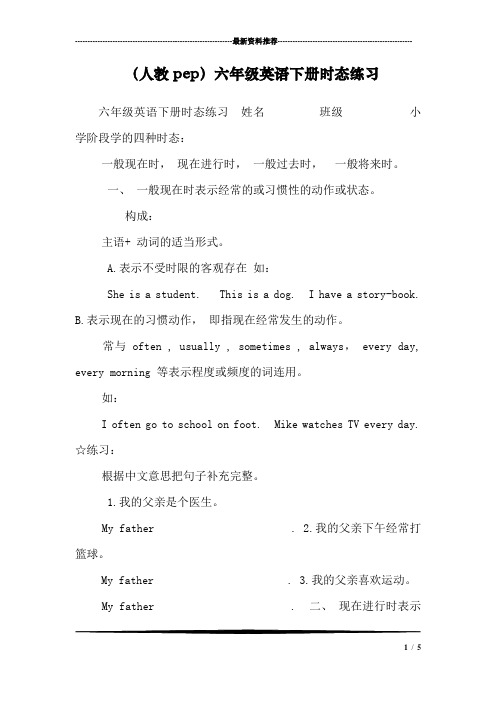
---------------------------------------------------------------最新资料推荐------------------------------------------------------ (人教pep)六年级英语下册时态练习六年级英语下册时态练习姓名班级小学阶段学的四种时态:一般现在时,现在进行时,一般过去时,一般将来时。
一、一般现在时表示经常的或习惯性的动作或状态。
构成:主语+ 动词的适当形式。
A.表示不受时限的客观存在如:She is a student. This is a dog. I have a story-book.B.表示现在的习惯动作,即指现在经常发生的动作。
常与 often , usually , sometimes , always, every day, every morning 等表示程度或频度的词连用。
如:I often go to school on foot. Mike watches TV every day. ☆练习:根据中文意思把句子补充完整。
1.我的父亲是个医生。
My father . 2.我的父亲下午经常打篮球。
My father . 3.我的父亲喜欢运动。
My father . 二、现在进行时表示1 / 5正在进行或发生的动作。
构成:主语+ be+动词的 ing 如:I am writing a letter. Amy is swimming. They are reading books. ☆练习:根据中文意思把句子补充完整。
1.我正在做作业。
I . 2.John 正在看电视。
John . 3.Amy和Sarah正在下棋。
Amy and Sarah . 三、一般过去时表示在过去某个时间发生的动作或存在的状态,也可表示过去经常或反复发生的动作。
常与 yesterday, yesterday afternoon, last year等表示过去的时间连用。
六年级下册英语试题 时态专项复习卷 人教PEP 有答案
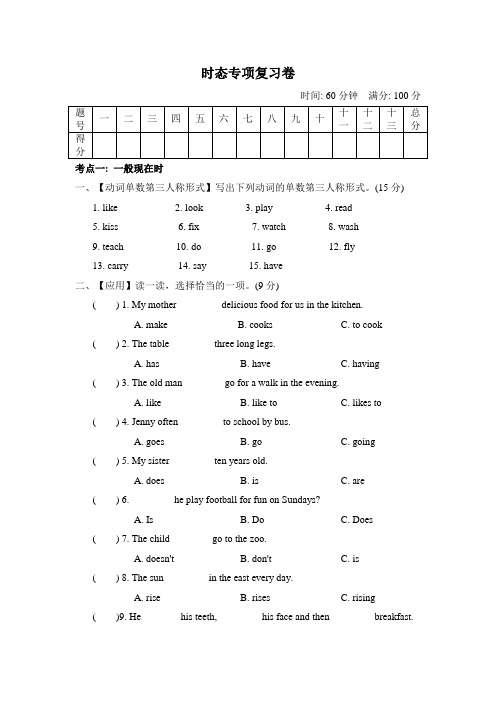
时态专项复习卷时间: 60分钟满分: 100分考点一: 一般现在时一、【动词单数第三人称形式】写出下列动词的单数第三人称形式。
(15分)1. like___________2. look________3. play__________4. read__________5. kiss__________6. fix__________7. watch________8. wash__________9. teach__________ 10. do________ 11. go__________ 12. fly____________13. carry________ 14. say________ 15. have________二、【应用】读一读,选择恰当的一项。
(9分)() 1. My mother ________ delicious food for us in the kitchen.A. makeB. cooksC. to cook() 2. The table ________ three long legs.A. hasB. haveC. having() 3. The old man________ go for a walk in the evening.A. likeB. like toC. likes to() 4. Jenny often ________ to school by bus.A. goesB. goC. going() 5. My sister ________ ten years old.A. doesB. isC. are() 6. ________ he play football for fun on Sundays?A. IsB. DoC. Does() 7. The child________ go to the zoo.A. doesn'tB. don'tC. is() 8. The sun ________ in the east every day.A. riseB. risesC. rising()9. He________his teeth, ________ his face and then ________ breakfast.A. brush; wash; haveB. brushes; washes; haveC. brushes; washes; has三、【句型练习】按要求完成下列句子。
六年级英语一般现在时试题
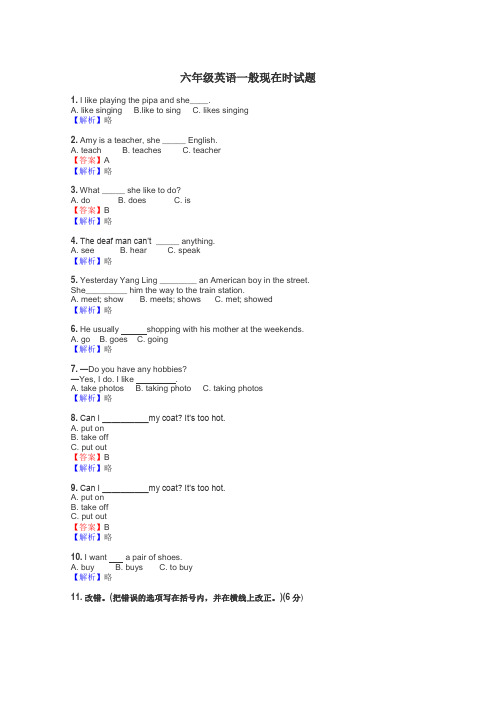
六年级英语一般现在时试题1. I like playing the pipa and she____.A. like singingB.like to singC. likes singing【解析】略2. Amy is a teacher, she _____ English.A. teachB. teachesC. teacher【答案】A【解析】略3. What _____ she like to do?A. doB. doesC. is【答案】B【解析】略4.The deaf man can’t _____ anything.A. seeB. hearC. speak【解析】略5. Yesterday Yang Ling ________ an American boy in the street. She_________ him the way to the train station.A. meet; showB. meets; showsC. met; showed【解析】略6. He usually shopping with his mother at the weekends.A. goB. goesC. going【解析】略7.—Do you have any hobbies?—Yes, I do. I like .A. take photosB. taking photoC. taking photos【解析】略8.Can I __________my coat? It’s too hot.A. put onB. take offC. put out【答案】B【解析】略9.Can I __________my coat? It’s too hot.A. put onB. take offC. put out【答案】B【解析】略10. I want a pair of shoes.A. buyB. buysC. to buy【解析】略11.改错。
人教版六年级英语下册时态专项练习卷(含答案)
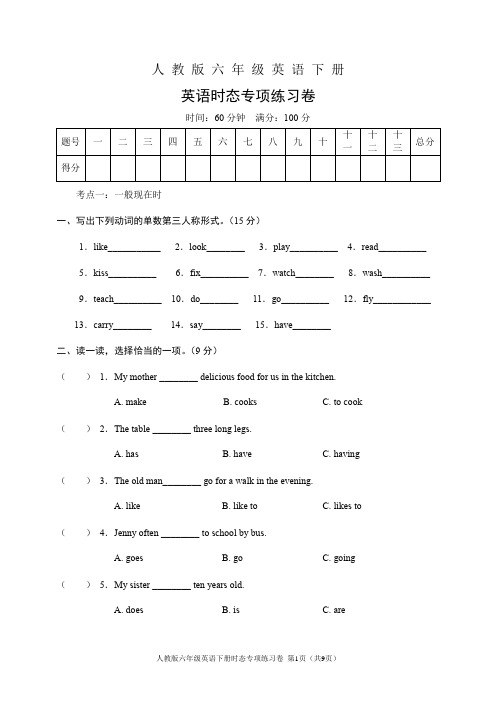
人教版六年级英语下册英语时态专项练习卷时间:60分钟满分:100分考点一:一般现在时一、写出下列动词的单数第三人称形式。
(15分)1.like___________ 2.look________ 3.play__________ 4.read__________ 5.kiss__________ 6.fix__________ 7.watch________ 8.wash__________ 9.teach__________ 10.do________ 11.go__________ 12.fly____________ 13.carry________ 14.say________ 15.have________二、读一读,选择恰当的一项。
(9分)()1.My mother ________ delicious food for us in the kitchen.A. makeB. cooksC. to cook()2.The table ________ three long legs.A. hasB. haveC. having()3.The old man________ go for a walk in the evening.A. likeB. like toC. likes to()4.Jenny often ________ to school by bus.A. goesB. goC. going()5.My sister ________ ten years old.A. doesB. isC. are()6.________ he play football for fun on Sundays?A. IsB. DoC. Does()7.The child________ go to the zoo.A. doesn'tB. don'tC. is()8.The sun ________ in the east every day.A. riseB. risesC. rising()9.He________his teeth, ________ his face and then ________ breakfast.A. brush; wash; haveB. brushes; washes; haveC. brushes; washes; has三、按要求完成下列句子。
【人教版】英语六下:一般现在时
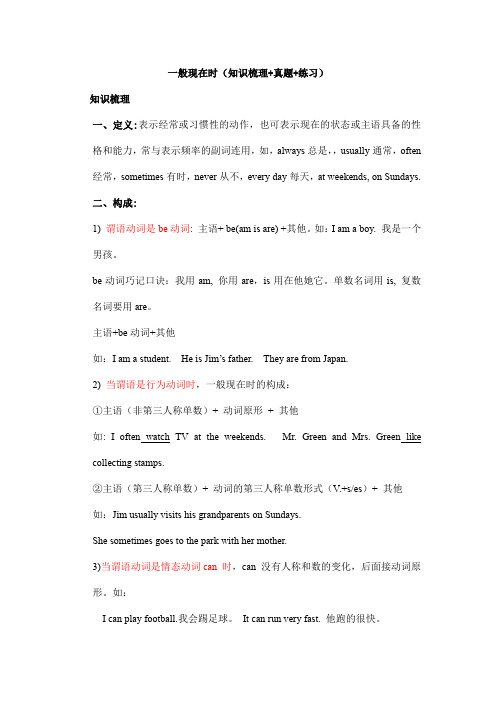
一般现在时(知识梳理+真题+练习)知识梳理一、定义:表示经常或习惯性的动作,也可表示现在的状态或主语具备的性格和能力,常与表示频率的副词连用,如,always总是,,usually通常,often 经常,sometimes有时,never从不,every day每天,at weekends, on Sundays.二、构成:1) 谓语动词是be动词: 主语+ be(am is are) +其他。
如:I am a boy. 我是一个男孩。
be动词巧记口诀:我用am, 你用are,is用在他她它。
单数名词用is, 复数名词要用are。
主语+be动词+其他如:I am a student. He is Jim’s father. They are from Japan.2) 当谓语是行为动词时,一般现在时的构成:①主语(非第三人称单数)+ 动词原形+ 其他如: I often watch TV at the weekends. Mr. Green and Mrs. Green like collecting stamps.②主语(第三人称单数)+ 动词的第三人称单数形式(V.+s/es)+ 其他如:Jim usually visits his grandparents on Sundays.She sometimes goes to the park with her mother.3)当谓语动词是情态动词can 时,can 没有人称和数的变化,后面接动词原形。
如:I can play football.我会踢足球。
It can run very fast. 他跑的很快。
They can jump.他们会跳。
三、动词第三人称单数形式(V. + s/es)的变化规则:①一般情况下,直接加s.如:like-likes,read-reads,visit-visits,play-plays,want-wants,work-works,know-knows,help-helps,get-gets.②以s, x, ch, sh, o结尾,加es . 如:wash-washes, watch-watches, go-goes,do-does, teach-teaches, pass-passes, guess-guesses.③以辅音字母+ y结尾,变y 为i,再加es.如:study-studies, fly-flies,carry-carries, worry-worries.④不规则变化。
一般现在时一般将来时现在进行时一般过去时there+be分类专项练习(试题)通用版英语六年级下册

一、选择题1. ---Can you ?---Yes, I can.I l ast night.A. dance,dancedB. dances,dancesC. danced,danced2.--- d id you go hiking?---Last weekend.A. WhatB. WhenC.Where3. I played basketball on the playground w eekend.A. thisB. nextst4. Tom very happy last night.A. looksB. isC. was5. They didn ’t k ites on their holiday.A. flyB. flyingC.flew6. John b asketball with his friends yesterday.A. playedB.playsC.play7. My grandparents usually the newspaper at 8:00 in the morning.A.readsB. readC.reading8. e veryone i n the classroom this morning?A. Do,studyB. Does,studyC. Did,study9.A:You s o busy.B:Oh,yes.My father and I m uch busier last week.A. are,areB. are,wereC. were,are10. d id you go last Friday?A. WhereB. WhatC. When二、根据所给的中文提示,填上合适的单词,把句子补充完整。
1.I (买了)some vegetables and meat yesterday.2.My mother (乘)a bus to the hospital. But the doctor was out.3.Sarah helped her mother (清洁)the room.4.They (拜访)their teachers last night.5.Do you like (看书上)?6.他的父母在中学教语文。
人教版(PEP)六年级下册英语四种时态复习
人教版六年级英语四种时态复习四种时态复习一般现在时的基本概念一般现在时表示现在经常反复发生的动作、存在的状态或习惯性的动作的时态。
常见的标志词(时间状语)主要有:every…, sometimes, at…, on Sundays, uauslly often, never, always等。
一般现在时的结构be动词的一般现在时主语+ Be动词+ 其他成分I am a boy.实义动词的一般现在时主语+ 行为动词+ 其他成分We study English.一般现在时的具体形式be动词的一般现在时1.第一人称单数I+amI am a student.2. 第二人称单数you和其他人称复数we/you/they+areYou are a lucky girl.We are students in this school.3. 第三人称单数he/she/it+isShe is my teacher.例题:用be动词的适当形式填空。
1. I from China.2. It very hot today.3. They in the hospital.4. We good students.5. She a beautiful girl.实义动词的一般现在时1.第一、二人称单数I/you和其他人称复数we/you/they+动词原形I get up at 8 o’clock.They go to school everyday.2.第三人称单数he/she/it+实义动词第三人称单数形式It runs fast.He studies hard.例题:用说给单词的适当形式填空。
1. We home every day.(go)2. Trees green in spring.(turn)3. He very hard.(study)4. The boy up at seven O'clock.(get)5. The earth round the sun.(move)补充:主语为第三人称单数形式,谓语动词的变化规则:一般现在时的句型变化be动词的一般现在时肯定句否定句He is a worker. 主语+ be动词+ not + 其他He is not a worker.一般疑问句特殊疑问句Be动词+ 主语+ 其他特殊疑问词+ 一般疑问句-Is he a worker?Where is he?-Yes, he is. / No, he is not.例题:写出下列句子中所缺的be动词,并用肯定及否定形式回答。
小升初语法辨析一般现在时一般过去时一般将来时(讲义)人教PEP版英语六年级下册
小升初英语语法辨析:一般现在时、一般过去时、一般将来时&专项模拟练习一、一般现在时1.定义:表示经常发生的动作、存在的状态或普遍真理。
2.时间标志词:often(经常)、usually(通常)、always(总是)、sometimes(有时)、every day/week/month/year(每天/ 周/ 月/ 年)等。
3.结构:1.主语(非第三人称单数)+ 动词原形。
例如:You play basketball afterschool.(你放学后打篮球。
)2.主语(第三人称单数)+ 动词的第三人称单数形式。
例如:He playsbasketball after school.(他放学后打篮球。
)4.用法:1.表示经常性或习惯性的动作。
如:I go to school by bike every day.(我每天骑自行车去上学。
)2.表示现在的状态或特征。
如:She is tall and thin.(她又高又瘦。
)3.表示客观事实或普遍真理。
如:The earth moves around the sun.(地球绕着太阳转。
)二、一般过去时1.定义:表示过去某个时间发生的动作或存在的状态。
2.时间标志词:yesterday(昨天)、last week/month/year(上周/ 上个月/ 去年)、ago(……以前)、in + 过去的年份等。
3.结构:主语+ 动词的过去式。
例如:You played basketball yesterday.(你昨天打了篮球。
)4.用法:1.表示过去某个时间发生的动作。
如:I went to the park last Sunday.(我上周日去了公园。
)2.表示过去存在的状态。
如:He was happy yesterday.(他昨天很开心。
)三、一般将来时1.定义:表示将来某个时间要发生的动作或存在的状态。
2.时间标志词:tomorrow(明天)、next week/month/year(下周/ 下个月/ 明年)、in the future(在未来)等。
人教PEP版六年级英语下册 小升初专项——时态一 一般现在时(含答案)
人教PEP版六年级英语下册小升初专项——时态一:一般现在时建议时间:30分钟满分:60分班级:姓名:得分: .一单项选择。
(10分)( )1.Wang Bing at home every day.He always his things in order.A.do well;putB.did well;putsC.does well;puts( )2.—What they often on Sundays?—They often play football on Sundays.A.does;doB.do;doesC.do;do( )3.—Jim like basketball?—Yes.He likes it very much.A.Does;playingB.Is;playsC.Did;play( )4.Jill and her friend often hiking on the weekend.A.wentB.goC.goes二用所给单词的适当形式填空。
(15分)1.She usually (study) English on Sundays.2.Sam often (clean) his bedroom on the weekend.3.Each girl (have) a dream.4.Jim always (do) his homework in the evening.5.How many lessons (do)Tim have on Mondays?三连词成句。
(注意大小写)(15分)1.reading,Peter,stories,likes(.)____________________________________________________________________ 2.John's,teaches,in,school,a,English,mother(.)____________________________________________________________________ 3.he,older,me,than,is,smarter,and(.)____________________________________________________________________4.buy,I,to,magazine,want,the,film,new(.)____________________________________________________________________ 5.mine,bigger,your,than,feet,are(.)____________________________________________________________________ 四按要求完成下列各题。
一般现在时练习题六年级
一般现在时练习题六年级一般现在时是表示经常性或习惯性动作、事实、真理等的时态。
下面是一些关于一般现在时的练习题及参考内容,帮助六年级学生巩固和提高对该时态的理解和应用能力:练习题1:用括号内所给动词的适当形式填空。
1. My sister _________ (like) to read books every night.2. They often _________ (play) football on Sundays.3. We _________ (have) lunch at school every day.4. Lisa _________ (go) to the park with her friends after school.5. He usually _________ (watch) TV before bedtime.参考内容:1. likes2. play3. have4. goes5. watches练习题2:按要求改写下列句子,保持时态一致。
1. Tom reads books every day. (改为否定句)→ Tom _________ books every day.2. We often eat lunch at the cafeteria. (对划线部分提问)→ _________ do you often eat lunch?3. She walks to school in the morning. (改为一般疑问句)→ _________ she _________ to school in the morning?4. My brother watches TV every evening. (用often替代every evening)→ My brother _________ watches TV.5. They have breakfast at 7 o'clock. (用usually替代at 7 o'clock) → They _________ have breakfast.参考内容:1. doesn't read2. When/What time3. Does, walk4. often5. usually练习题3:根据提示完成下列句子,每空一词。
- 1、下载文档前请自行甄别文档内容的完整性,平台不提供额外的编辑、内容补充、找答案等附加服务。
- 2、"仅部分预览"的文档,不可在线预览部分如存在完整性等问题,可反馈申请退款(可完整预览的文档不适用该条件!)。
- 3、如文档侵犯您的权益,请联系客服反馈,我们会尽快为您处理(人工客服工作时间:9:00-18:30)。
人教版六年级英语下册一般现在时态练习题一般现在时【第三人称单数形式 PEP Book 7 Unit 4 I have a pen pal】Hello, boys and girls.我是一般现在时,你们想知道我的故事吗?Let me tell you!首先,介绍我的本领。
我的本领有三样:1.表示事物或人物的特征.状态。
如:The sky is blue.天空是蓝色的。
2.表示经常性或习惯性的动作。
如:I get up at six every day.我每天六点起床。
3.表示客观现实。
如: The earth goes around the sun.地球绕着太阳转。
第二,请看我的面目--构成:1. be动词:主语+be(am ,is ,are)+其它。
如:I am a boy.我是一个男孩。
2.行为动词:主语+行为动词(+其它)。
如: We study English.我们学习英语。
当主语为第三人称单数(he, she ,it)时,三单变化:多数在动词后加s ,play—plays like—likes 以s,x,sh,ch,o结尾的动词加es go—goes wash—washes,以辅音字母加y结尾,把y改i再加es,fly—flies 。
第三,我的变化--否定句.一般疑问句.特殊疑问句:1. be动词的变化。
否定句:主语+ be + not +其它。
如:He is not a worker.他不是工人。
一般疑问句: Be +主语+其它。
如:-Are you a student? -Yes. I am. / No, I'm not.特殊疑问句:疑问词+一般疑问句。
如:Where is my bike?2.行为动词的变化。
否定句:主语+ don't( doesn't ) +动词原形(+其它)。
如:I don't like bread.当主语为第三人称单数时,要用doesn't构成否定句。
如:He doesn't often play.一般疑问句:Do( Does ) +主语+动词原形+其它。
如: - Do you often play football?- Yes, I do. / No, I don't.当主语为第三人称单数时,要用does构成一般疑问句。
如: - Does she go to work by bike?- Yes, she does. / No, she doesn't.特殊疑问句:疑问词+一般疑问句。
如:How does your father go to work?需要掌握的一般现在时第三人称单数形式:Lives, teaches, goes, watches, reads, does, works,does, doesn’t。
小朋友们,下次见到我时,千万不要忘记我是"一般现在时"啊!See you next time!一般现在时练习I. Choose the right answers to cloze.用括号内适当的形式填空。
1.We often _(play) in the playground.2. He _ (get) up at six o’clock.3. _you _ (brush) your teeth every morning.4. What _(do) he usually _(do) after school?5. ______ they ________(like) the World Cup?6. _Mike sometimes __________(go) to the park with his sister.7. At eight at night, she _ (watch) TV with his parents.8 _ Mike _ (read) English every day?9. How many lessons _your classmate________(have) on Monday?10. What time _his mother (do) the housework?11.He usually _____ (get)up at six in the morning.1⒉She______(have) blues eyes.1⒊We _______(go ) to school every day1⒋The boy _________(like) playing football.1⒌We_______(have)no classes on Sundays.1⒍She________(write) to her mother once a week.1⒎It _____(rain)quite often during the month of July every year.1⒏She often_________(watch)TV on Saturdays.1⒐Mike usually_________(ride) a bike with his friends in the park.20 Peter and Mary often_______(play) badminton together.23.My mother______(have) a lot of cousins.21.Many people often _______ (listen) to the radio in the moring.22.______(do)she _______(like) playing the violin?Yes,she______(do).23.She_____(have)four brothers. She______(like) them very much.24. He often ________(have) dinner at home.25. We _______(not watch) TV on Monday.26.Sandy usually _______(play) the piano on Sundays.27.The cat________(like) eating fish every much.28. Su Hai and Su Yang _______(have) eight lessons this term.29. She and I ________(take) a walk together every evening.II. Read and fill in the blanks.(选词填空)Watches read goes gets eats lives works My aunt is a nurse. She likes music very much. She ______ in a big hospital. Every day she ______ up at 6:30. She ______ breakfast at 7:00. After breakfast she ______ to work by bus. She usually goes home at 5:30. After dinner, she often ______ TV and ______ books. At 10:30, she goes to bed.III. Read the questions and circle the right answers.(读问题,圈出正确的答案)1.Where does your pen pal live?A. No, she live in the country.B. She live in the city.C. She lives in the city.2.When does she go to work?A. She go to work at 7.B. She goes to work at 7.C. Yes, she does.3. Does Peter go to school by subway?A. No, he does.B. No, he doesn’t.C. Yes, on foot.4. What does Miss Green do?A. She teaches English.B. Yes, she’s a teacher.C. At school.5.Does she read newspapers at night?A. Yes, she do.B. Yes, she does.C. No, she does.6.What’s your pen pal’s hobby?A. She like reading.B. She like read.C. She likes reading.将来时态练习Be going to【PEP Book 7 Unit 3 What are you going to do?】的用法Hi,大家好!今天向你们介绍一位爱展望未来的小精灵be going to。
他呀,出生在"一般将来时"家族里。
表示将来某个时间将要发生的动作或存在的状态。
看"be going to"长得多魁梧呀,他由三个词组成。
这三个词分开来都有自己的意思。
但组合在一起,只表示"打算,将要"。
其中"be"妈妈会根据主语的人称变化派出孩子们"is, am ,are"来完成任务。
"to"是"不定式符号"。
它有一个脾气,跟在它后面的动词必须是动词原形。
首先,我向你们展示我的几种句型。
一. 陈述句(肯定句) 【2】在肯定句中,小精灵的模样是:主语+be(am / is / are) + going to +动词原形+其它。
如:He is going to buy a new CD after school.他放学后要去买张新CD。
They are going to visit their teacher tomorrow.他们明天要去看望他们的老师。
在否定句要在be的后面加not.不信你来瞧:1.I am not going to play football after school.我不打算踢足球。
She is not going to watch TV this afternoon.今天下午她不打算看电视。
